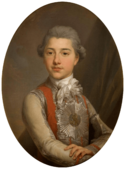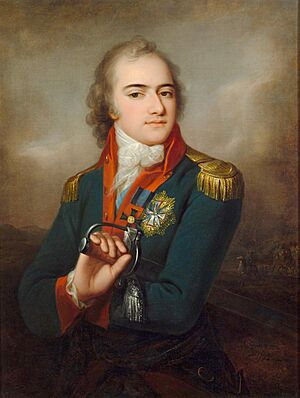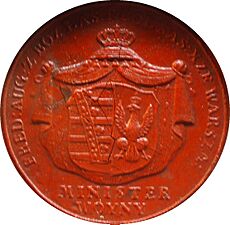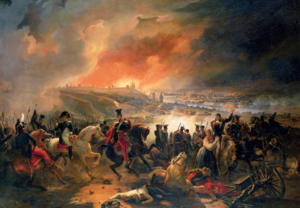Józef Poniatowski facts for kids
Quick facts for kids
Marshal of the Empire
Prince
Józef Antoni Poniatowski |
|
|---|---|
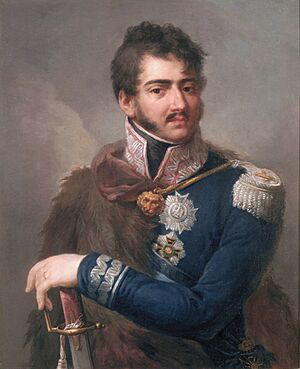
Portrait by Josef Grassi, ca. 1810
|
|
| Nickname(s) | The Polish Bayard |
| Born | 7 May 1763 Palais Kinsky, Vienna, Habsburg Monarchy |
| Died | October 19, 1813 (aged 50) White Elster River, Kingdom of Saxony |
| Allegiance | |
| Years of service | 1780–1813 |
| Rank | Marshal of the Empire |
| Awards | |
| Spouse(s) | Zelia Sitańska |
| Signature | |
Prince Józef Antoni Poniatowski (7 May 1763 – 19 October 1813) was a famous Polish general and war minister. He became a Marshal in the French army during the Napoleonic Wars.
Józef was the nephew of Stanislaus Augustus of Poland, the last king of Poland. He started his military career in 1780 in the Austrian army. In 1789, he joined the Polish army at his uncle's request. As a major general, he fought in the Polish–Russian War of 1792. He led Polish forces to victory at the Battle of Zieleńce. After the king joined a pro-Russian group, Poniatowski resigned. In 1794, he helped defend Warsaw during the Kościuszko Uprising. This led to him being sent away until 1798.
In 1807, Napoleon Bonaparte created the Duchy of Warsaw. Józef Poniatowski was made its minister of war. He commanded an army of 16,000 soldiers during the Austro-Polish War in 1809. He won a key battle at Raszyn against a larger Austrian force. This victory helped the Duchy of Warsaw get back some lands lost during the Partitions of Poland.
Poniatowski was a loyal friend and supporter of Emperor Napoleon I of France. He joined Napoleon's invasion of Russia in 1812. He was injured fighting near Moscow. This forced him to return to Warsaw to rebuild the Polish army. In 1813, he covered the retreat of the French army after Napoleon lost the Battle of Leipzig. Poniatowski was wounded many times and drowned in the Elster River.
Contents
Early Life and Military Beginnings
Prince Józef Antoni Poniatowski was born in Vienna, Austria, in the Palais Kinsky. His father, Andrzej Poniatowski, was the brother of Poland's last king, Stanislaus II Augustus. Andrzej was also a field marshal in the Austrian army. Józef's mother was Countess Maria Theresia Kinsky. She came from an important Czech-Austrian noble family.
Józef's father died when he was ten. His uncle, King Stanislaus Augustus, then became his guardian. They had a very close relationship. Józef grew up in Vienna but also spent time in Prague and Warsaw. He learned French, Polish, German, and later, Russian. As a child, he was called "Prince Pepi."
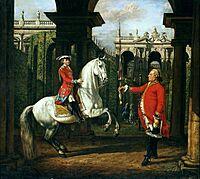
He was trained for a military career. He also learned to play keyboard instruments. He even carried a portable one during military campaigns. Because of his uncle's influence, Poniatowski chose to be a Polish citizen. He joined the Polish army when he was 26.
In 1780, Poniatowski joined the Austrian imperial army as a lieutenant. By 1788, he was a colonel. When Austria declared war against the Ottoman Empire in 1788, he became an aide to Emperor Joseph II. Poniatowski fought in this war. He showed great bravery at the storming of Šabac on April 25, 1788. He was seriously wounded there. He also saved the life of a younger officer, Prince Karl Philipp Schwarzenberg. Later, Schwarzenberg would be one of the generals who defeated Napoleon at Leipzig, where Poniatowski died.
Serving Poland and Defending the Constitution
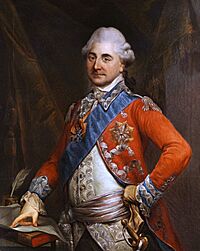
King Stanislaus II Augustus asked Poniatowski to return to Poland. The Polish army was being reorganized. In October 1789, Poniatowski became a major general. He was put in charge of a division in Ukraine. He worked hard to rebuild the small Polish army.
This happened during the Four-Year Sejm, a special parliament. It ended with the 3 May Constitution in 1791. Poniatowski strongly supported these reforms. He was part of the "Friends of the Constitution Association." His soldiers helped protect the Royal Castle during the final vote.
On May 6, 1792, Poniatowski became a lieutenant general. He commanded the Polish army in Ukraine. His job was to defend Poland from a Russian attack. His forces were much smaller than the enemy's. They often had to retreat. But Poniatowski fought bravely and won several important battles.
The Battle of Zieleńce on June 18 was the first major Polish victory in a long time. Poniatowski personally joined the fighting when one Polish group struggled. To celebrate this win, the Polish king created the Virtuti Militari order. Poniatowski and Tadeusz Kościuszko were the first to receive it. At the Battle of Dubienka on July 18, Polish soldiers defended the Southern Bug River for five days against much larger forces.
The Polish armies gathered near Warsaw. They prepared for a big battle. But then, a message came from the capital. King Stanislaus had joined the pro-Russian Targowica Confederation. He also pledged the Polish Army to it. All fighting was to stop.
The army remained loyal to Prince Józef. He thought about taking control of the king. But he decided not to. Poniatowski and most other Polish generals resigned. They left the army. His soldiers honored him with a special medal. Poniatowski left Warsaw for Vienna. He traveled in western Europe. This was a time of big changes because of the French Revolution. The Polish–Russian War of 1792 led to the Second Partition of Poland.
The Kościuszko Uprising of 1794
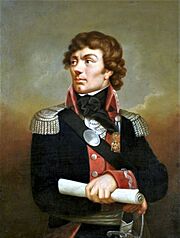
In 1794, King Stanislaus Augustus asked his nephew to return to Poland. He wanted him to serve under Tadeusz Kościuszko in the Kościuszko Uprising. Poniatowski joined Kościuszko's camp on May 27. Kościuszko offered him command in Lithuania. But Poniatowski wanted to stay closer to his uncle. He fought in and around Warsaw.
As a division commander, he fought at Błonie in July. He also led cavalry attacks. During the Prussian siege of Warsaw, Poniatowski helped defend the city. He was injured when his horse was shot. He also led a costly attack on Prussian defenses at the Bzura River. This helped save another Polish corps.
After the uprising failed, Poniatowski stayed in Warsaw for a while. His lands were taken away. He refused to join the Russian army. He was ordered to leave Warsaw. In April 1795, he moved back to Vienna. The Kościuszko Uprising led to the Third Partition of Poland.
Life Away from the Battlefield
In 1796, Catherine II of Russia died. Her son, Tsar Paul I, returned Poniatowski's lands. He tried to hire him for the Russian army. Prince Józef said he was too sick from old wounds.
In 1798, his uncle, the former King Stanislaus Augustus, died in St. Petersburg. Poniatowski went to the funeral. He stayed in St. Petersburg for several months. He got along well with Tsar Paul. Then, he returned to Poland. He lived on his estates in Warsaw and Jabłonna. At this time, Warsaw was under Prussian rule.
Until 1806, Poniatowski lived a private life. He hosted many parties and social events. His homes were open to various important people. For example, the future King Louis XVIII of France stayed at Poniatowski's Łazienki Palace for a few years.
Prince Józef never married. He had two sons.
Leading the Duchy of Warsaw Army
In November 1806, French Emperor Napoleon I won the Battle of Jena. Prussia then left its Polish areas. The Prussian king Frederick William III asked Poniatowski to govern Warsaw. Poniatowski agreed. He also took command of the city's guard. This Polish authority was short-lived. New events in Europe gave Poles new chances.
Later that year, French forces entered Warsaw. Poniatowski had to decide his role. After talks with French General Joachim Murat, Poniatowski became "chief of the military force." He led the military department for the French. On January 14, 1807, Napoleon created the Warsaw Governing Commission. Poniatowski became the Director of the Department of War. He began organizing the Polish army.
In July 1807, the Duchy of Warsaw was created. On October 7, Poniatowski became its Minister of War and Head of Army. Napoleon did not fully trust him yet. So, General Davout held supreme military command until mid-1808. Poniatowski officially became Commander in Chief on March 21, 1809. He worked hard to build this new Polish army. The Duchy's army faced many challenges. It was often underfunded. Many units were used by Napoleon outside the country. This meant Prince Józef had a small force for the 1809 war.
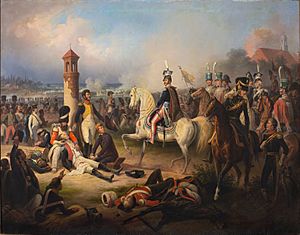
In spring 1809, Poniatowski led his army against an Austrian invasion. This was part of a larger war between Austria and Napoleon's France. At the bloody Battle of Raszyn near Warsaw on April 19, Poniatowski personally led his men. His Polish forces fought a larger Austrian army to a standstill. After the battle, he decided not to defend Warsaw. He moved his units to the east bank of the Vistula River. The Austrians attacked, but were defeated at Grochowo on April 26.
Poniatowski then advanced south. He stayed near the Vistula River. He took control of large areas of Galicia. This was southern Poland, controlled by Austria. On May 14, Lublin was taken. On May 18, Sandomierz was captured. On May 20, the Zamość fortress was taken. They captured 2,000 prisoners and 40 cannons. Even further east, Lwów was taken on May 27. These victories forced the Austrians to leave Warsaw.
Poniatowski then moved west of the Vistula. On July 5, he began a new offensive toward Kraków. He arrived there on July 15. The Austrians tried to give the city to the Russians. But Poniatowski was not to be stopped. He rode his horse into a Russian cavalry unit blocking a street. Most of the lands he freed became part of the Duchy of Warsaw. This happened through a peace treaty on October 14, 1809. Prince Józef stayed in Kraków until December. He oversaw the temporary government there.
Napoleon's Russian Campaign
In April 1811, Poniatowski went to Paris. He represented the King of Saxony and Duke of Warsaw. He stayed for four months. He worked with Napoleon on plans for the war against Russia. He tried to convince Napoleon to attack through Ukraine. He thought Polish nobles there would join them. But Napoleon refused this idea.
For the Russian Campaign of 1812, Poniatowski commanded the V Corps of the Grande Armée. This Polish force was nearly 100,000 strong. It was the largest Polish military effort before the 20th century.
Poniatowski fought bravely on the advance to Moscow. He distinguished himself in many battles. On August 17, at Smolensk, he personally led his corps' attack on the city. On September 7, at Borodino, the V Corps fought all day for the Utitza Mound. Prince Józef led the entire corps to take it. On September 14, Polish soldiers were the first to enter the Russian capital. But Poniatowski felt the campaign was doomed.
The Polish corps fought battles at Chirikovo and Vinkovo. At Vinkovo, Poniatowski saved Murat from defeat by Kutuzov's forces. While covering the retreat of the Grande Armée, Poniatowski was badly injured at the Battle of Vyazma. He continued to serve for a few days. But his injuries forced him to give command to Józef Zajączek. He then traveled west in a carriage. At the Berezina crossing, they barely escaped capture. On December 12, they arrived in Warsaw.
The German Campaign of 1813 and Death
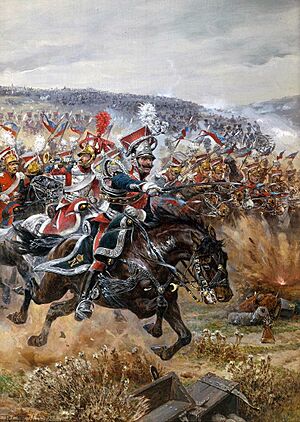
After Napoleon's army retreated, Poniatowski quickly rebuilt the Polish army. Many Polish leaders began to doubt Napoleon. But Poniatowski remained loyal. Even when Tsar Alexander I offered him peace, he refused. On February 5, as the Russian army neared Warsaw, Polish units moved out. They reached Kraków.
On May 7, Prince Józef and his army left Kraków. They went through Bohemia to Saxony. His forces totaled 22,000 men. His corps fought successful battles at Löbau on September 9 and Zedtlitz on October 10. At Zedtlitz, General Pahlen tried to stop them. But Poniatowski led a cavalry charge and defeated him. On October 12, Poniatowski was surprised by enemy units. He broke through, getting a minor arm wound. He returned with another cavalry charge, saving the situation.
For his bravery, on October 16, during the Battle of Leipzig, Poniatowski was made a Marshal of the Empire. He was given the job of covering the French Army's retreat. He defended Leipzig, losing half his corps. He slowly fell back toward a bridge over the White Elster river. In the confusion, the French blew up the bridge before he could reach it. Poniatowski tried to escape across the Elstermühlgraben. But he was badly injured and drowned in the river.
Legacy
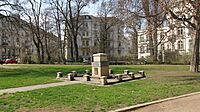
After his death, people greatly admired Poniatowski. He became a Polish hero, much like Napoleon was for the French. His remains were brought to Poland in 1817. He was buried in the cathedral on Kraków's Wawel Hill. He rests beside Tadeusz Kościuszko and John III Sobieski.
In 1829, a monument by Bertel Thorvaldsen was built in Warsaw. It was destroyed during World War II. But a copy, the Monument to Prince Józef Poniatowski, now stands in front of the presidential palace in Warsaw.
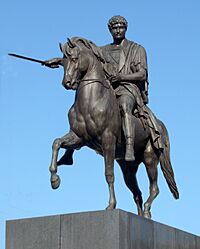
He is shown in Jan Matejko's 1891 painting, Constitution of 3 May 1791. Poniatowski inspired Polish freedom fighters. Especially during the November Uprising of 1830. Many of its leaders had served under him. The Duchy of Warsaw, which he defended, remained a Polish state.
A Japanese manga, Ten no Hate made - Porando hishi, was written in 1991. It tells the story of Józef Poniatowski's life. A Polish bomber squadron was named after Poniatowski. It took part in air operations during World War II.
Historian Norman Davies wrote about him:
Like many of his countrymen, he had wavered long before throwing in his lot with the French. For him, Napoleonic service had demanded a painful change of direction and loyalties. It had involved years of devotion and blood-letting. To have changed his loyalties yet again, as his master the King of Saxony did, was all too worrying for an infinitely weary and honest man. Like the rest of his generation he hoped; he fought; he served; and only found rest in honorable defeat.
See also
 In Spanish: Józef Antoni Poniatowski para niños
In Spanish: Józef Antoni Poniatowski para niños
- Stanisław August Poniatowski – Stanislaus Augustus
- Poniatowski family
 | Sharif Bey |
 | Hale Woodruff |
 | Richmond Barthé |
 | Purvis Young |


